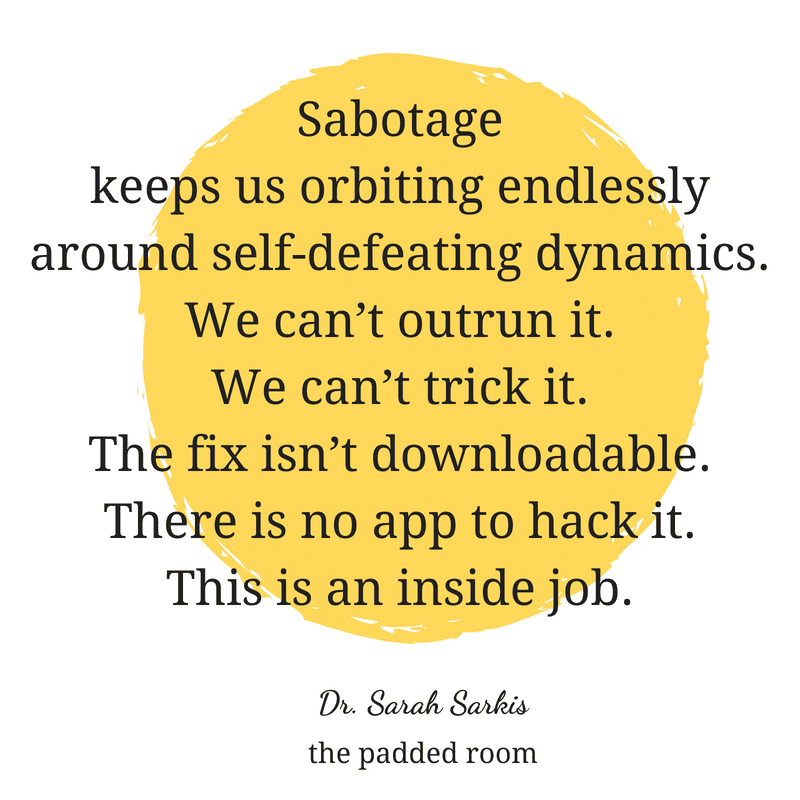I recently wrote an essay titled Sabotage: An Inside Job. Many readers contacted me and asked for a list of things to be mindful of when observing self-sabotage at play.
So even though my regular readers know I have an aversion to “lists,” in this blog I will list the six sneaky (and highly common) ways people engage in self-sabotage and don’t even realize it. Remember, it’s our unconscious patterns that rule the roost. Start to observe the things you don’t even recognize as unusual.
These are in in no particular order of importance.
1.) The Blame Game:
Where do I even start with blame? In the next few weeks I’ll be posting an entire essay on the neurobiology and psychology behind chronic blaming so check back in on that topic. But let’s tackle it here as it specifically relates to self-sabotage.
The moment we indulge that inclination to make our lot in life someone else’s fault, we’ve surrendered our power. That power we have as sapiens is the ability to accept responsibility and be accountable for our thoughts, feelings, and (re)actions. People who chronically blame are always in the role of victim. They tend to lack tenacity to chase their own dreams, to hustle, and almost always lack the curiosity about how they could have participated in a better or different outcome.
Chronic blaming is also representative of a regressed style of behavior. In typical development, we would see our children evolve out of blame and towards accountability around puberty. That accomplishment, the ability to take responsibility for your own being, is a developmental culmination decades in the making, which converges in adolescence and matures with us as we age. When we see someone who is stuck in the blame game we are witnessing someone who has become stuck in a pre-adolescent style of orbiting in the world.
There is always a unique and complex psychology behind the instinct to blame that must be brought to light in any path towards change and growth.
Begin to observe who and when and why you are handing over your power through the habit of blame. It doesn’t behoove you to constantly place yourself in the control of others. Start to take back the instinct to blame. Reframe everything you want to blame on others, “You made me….” to “I chose to…”.
Observe if this pattern of blame reminds you of any dynamics from your childhood. Observe how deep the roots of blame go. Chronic blame is often a signal of deeper emotional traumas that have not had the opportunity to heal.
2.) Don’t Quit Before The Magic Happens:
Lots of people have dreams. I’m in the business of dreams, literally and figuratively. But A LOT of people quit, lose interest, don’t want to work that hard, etc. etc. before all the magic can happen. It takes time and effort (so much effort) to make shit happen. Very few people achieve anything in life, let alone psychological wellness, without decades of effort in their rear view mirrors. Don’t kid yourself, the people you are comparing yourself to and thinking “I’m just not that lucky”-it isn’t luck. It’s hard work. Don’t quit before the magic happens. Stick with something long enough to see it through.
There are emotional and psychological reasons you keep abandoning your dreams. There are reasons and motivations behind why you have lots of half completed projects, but no real end product. Your inattention, lack of focus, and habit to quit are reflective of your neurobiology. Start to observe that instinct to quit. Observe the patterns in your life around task completion, attention to see it through, and commitment to risk. Start to be curious about why you do that. Resist the urge to turn that reflection outwards towards whose fault it is. You don’t want to inadvertently back yourself into the blame game. Just observe your own interior world.
3.) Stop Comparing Yourself to Others:
Our brains are meaning making machines. That’s what they do 24/7. They make meaning out of the stimuli and experiences we feed it, so wherever you turn your focus that is where you are going to end up. In other words, stop looking to the left and right of you, stop comparing yourself to others, and get focused on the horizon where you want to go. Forward. Remember you end up exactly where you focused your attention.
When you compare yourself to others you turn your attention away from your own goals and towards a different end point. In this day and age of social media it is easy to spend hours comparing yourself to others. But that is lost time you could have spent investing in your own journey. Turn inward for your sources of motivation and commitment.

4.) You Prioritize Being “Liked” Versus Being of Value/Service:
Every time you bump up against that feeling of wanting to be liked, or to get likes, every time that disease to please surfaces you are in danger of self-sabotage. I know it is hard. I suffer too from this epidemic. But resist the urge.
Replace the disease to please with a more authentic true north. Ask yourself how can I be of value or how can I be of service?
To what you ask?
I don’t have a horse in that race. A cause, a career, a movement, a lifestyle, whatever. But do what you do from a place of value and worthiness versus the need for affirmation. Remember, your emotions and feelings are the fuel sources that direct your brain and mind to move forward. Make sure you are observant and mindful of where you source your emotional fuel. It matters.
5.) You Get Stuck On Intention Setting Versus Goal Setting:
Don’t get me wrong it is important to set intentions. Intentions matter. Intention are sparks that ignite tiny fires in our neurotransmitters that eventually become the flames that fuel our long-term vision. Without the spark we can’t generate the fire. But intentions are only a spark. Goals, daily, weekly, monthly actionable steps, are the fire. You want the fire to be slow burning fuel source. Change, achievement, and growth of any kind require a slow and steady burn.
In order for me to get my doctorate I had to set that intention. But then I also had to set tiny micro goals in order to see that vision through. Take GRE’s, find schools, do applications, write essays. The same process has been true for any of my other accomplishments in life, this blog and my efforts towards mid-career reinvention included. It’s hard work. I have to set daily, weekly, and monthly goals that support the larger vision or intention I have for my life. Growth and change are action verbs. Find the small goals you can do, actionable steps each day towards your own unique goal, whatever that maybe.
Observe where you are stalling at the intention level and start setting actionable steps or goals that you need to be put into action in order for you to move forward in life. When you find this hard to do, observe that. What are the feelings that get in the way of you moving forward with actionable steps towards your dreams and goals?
6.) Neglecting Your Mind:
In this modern society we are creating if you do not create time each day to quiet your mind, there is very little chance you can stay a shoulder length ahead of your own bullshit.
There are just way too many temptations out there nowadays. It used to be booze and sex. Now its booze and sex and drugs and online shopping and social media and tinder and grinder and YouTube and I could go on and on. There is nothing more important than regaining a foothold on how you use your mind and brain. It’s such a delicate, robust, and powerful partnership between the mind and the brain. Please use it wisely.
Remember when we are truly invested in understanding our own patterns of sabotage, we are taking back the reigns on our interior life first and foremost. We cannot embark on any long-term process of change if we cannot tolerate sitting in our own skin and bones. Self-reflection is the antidote to self-sabotage. Know thyself. To thine own self be true.






Self sabotage has plagued me for more than THIRTY years. Thank you for such valuable insight.